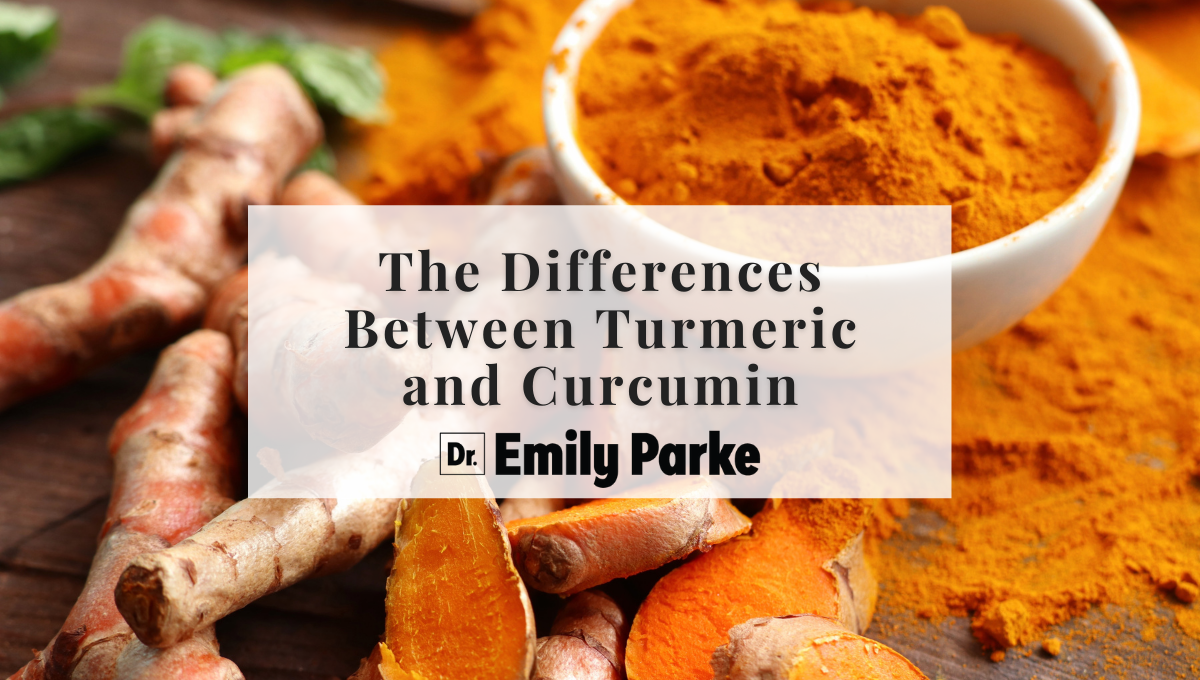

Hi, this is Dr. Emily Parke with your next Functional Health Minute. Today, I’d like to talk a little bit about turmeric and curcumin. What’s the difference between them and what are some of the health benefits? So of course, turmeric is the whole food. You can go and buy turmeric root at the grocery store. You can put it in smoothies. You can juice with it. You could dry it out. You can actually buy it as a dried spice, of course, and add that to your foods. So it’s always great to get something in the whole food form, or as close to it as possible. So that’s one of the reasons why when I recommend patients supplement with it, actually use a full spectrum turmeric complex that contains curcumin or curcuminoids, but also contain a lot of the other parts to the turmeric root that have really good health benefits, like the tumerin, the other curcuminoids the volatile oils, and so on.
So this is my product called Curcumin Max, and it is a full spectrum turmeric complex that does have everything I just said in it. And that’s for the maximum health benefit. So let me talk to you a little bit about why you would consider taking turmeric. Of course, my top recommendation for it is it’s anti-inflammatory. It’s also the immune system modulating. It can also help with pain control. So those are the top reasons I’m usually prescribing it. But what else does it do? So besides being anti-inflammatory, immune supporting, and immune balancing, it actually also helps with the gut microbiome quite a bit. There are some really good studies to say that it increases the gut microbiome diversity and also intestinal barrier function, meaning it helps with leaky gut as well. So, if we get really specific on this part, it supports the beneficial bacteria, like our bifidobacteria and lactobacillus, and also the butyrate-producing bacteria. So butyrate is a short chain fatty acid that good, healthy gut bacteria produce that happens to also be anti-inflammatory. So that’s another thing that turmeric does.
It also helps balance the endotoxins in the gut, it does this by helping block the attachment of it, endotoxins. Has the word toxin in it. So they are a specific type of bacteria that can be especially damaging when you have something like leaky gut or intestinal permeability. They can get into the bloodstream and cause symptoms. So again, turmeric/curcumin, I really like to use a combination. That’s a full spectrum turmeric complex that contains the curcuminoids in it. Top reasons to use it: anti-inflammation.
And so, what specifically does it do? It actually decreases a signaling cascade of interleukin 6, TNF-alpha, NF-kappa B. So some of our major inflammatory signaling molecules, it helps dampen those, decrease those. And it really is more immune system balancing and supporting. So those are the top reasons I like to use it, but I wanted to do this video to also include some of the other less common/less popular known reasons to consider doing a turmeric or curcumin supplementation, and that is the benefits in the gut. This is Dr. Emily Parke with today’s Functional Health Minute.
Share:
Dr. Emily Parke
Related Posts

What Is Sleep Apnea? Symptoms, Risks, and Treatment Options
Sleep apnea occurs when breathing repeatedly stops and starts throughout the night. Learn the symptoms, risks, and sleep apnea treatment options.

Estrogen Metabolism: How It Works, Why It Matters, and Supplements for Healthy Estrogen Metabolism
Estrogen metabolism is vital to estrogen regulation. Learn how it works and how the DUTCH test can provide insight into hormonal imbalance.

The Paleo Diet Versus the Autoimmune Paleo Diet: Differences and Benefits
Learn the difference between the paleo and the autoimmune paleo diet, including food lists, what foods to avoid, and all the health benefits!

A Complete View of Multiple Sclerosis: Symptoms, Diagnosis, and Functional Medicine Treatment Options
Get a complete view of multiple sclerosis, including common symptoms and treatment options, including nutrition and supplementation.
